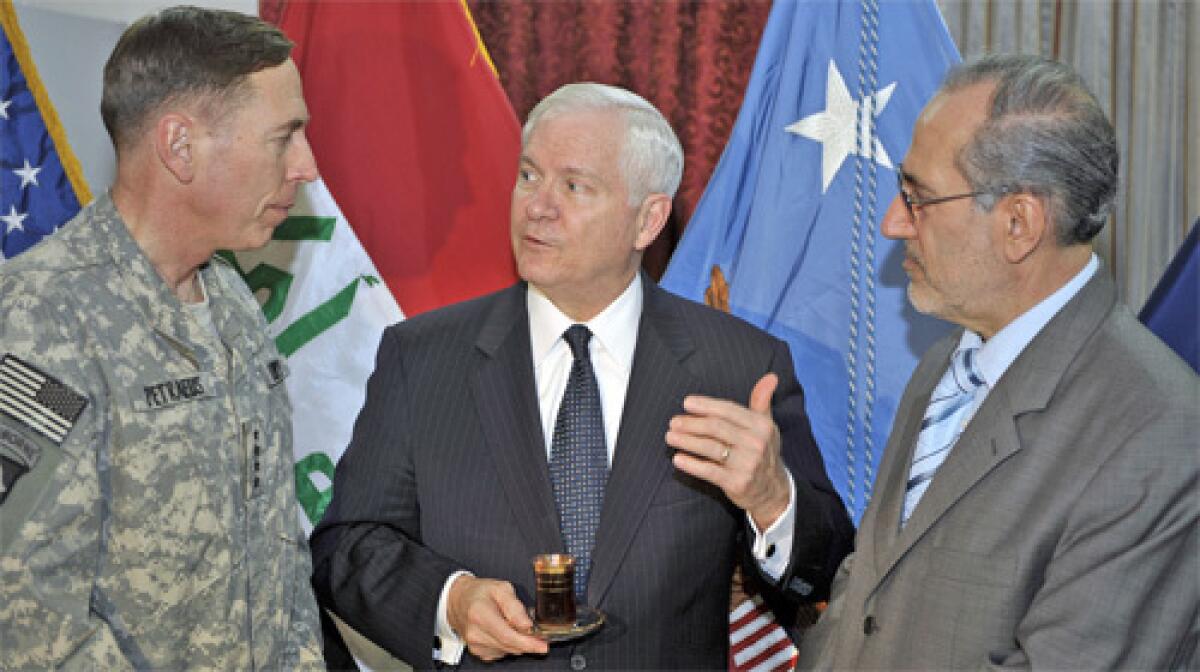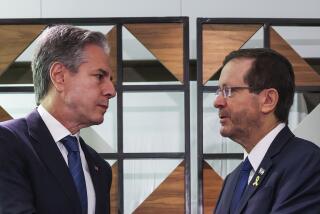Gates signals possible break in Iraq troop withdrawals

Defense Secretary Robert M. Gates on Monday endorsed the idea of a pause in the American troop drawdown this summer, as bombers killed at least 22 Iraqis in attacks targeting U.S.-allied tribal leaders.
Gates’ comments followed a meeting with the commander of U.S. forces in Iraq, Army Gen. David H. Petraeus, who favors a temporary break in the troop reduction after the last of five extra brigades leaves as planned in July. The brigades were deployed last year to quell Iraq’s bloodshed, and their departure will bring troop levels down to about 134,000, the lowest since January 2007.
Bloodshed has eased, but ground commanders such as Petraeus warn that it could surge anew if troops are pulled out too quickly. Some senior Pentagon officials, however, favor a drawdown beyond the five brigades to relieve stress on troops, many of whom are on their third or fourth deployments.
Gates previously had expressed hope that conditions in Iraq would permit withdrawals to continue through the end of this year, until there were about 100,000 troops in the country, but two hours of talks with Petraeus apparently changed his mind.
Speaking about Petraeus’ desire for a pause, Gates said it “probably does make sense” for a “brief period.” He said the ultimate decision lay with President Bush.
Although violence has dropped in most of the country, insurgents remain active. In particular, they have stepped up attacks on supporters of the Awakening movement, started by Sunni Muslim tribal sheiks from Anbar province in late 2006 to fight Sunni insurgents.
The movement has spread across most of Iraq and has spawned grass-roots police forces manned by Iraqis who are paid $10 a day by the U.S. military. Attacks on them and on Awakening leaders have doubled since October, according to the U.S. military.
On Monday, a group of Awakening leaders from Anbar were meeting in Baghdad’s Karada neighborhood when a car bomb exploded at a nearby gas station. Minutes later, a suicide bomber rammed a van into a checkpoint guarding the compound where the meeting was taking place.
Ali Hatem Ali Suleiman, a tribal sheik who was hosting the gathering in his compound, said six of his guards were killed. “The office collapsed on my head,” said Suleiman, who had left the other sheiks in the meeting room and was upstairs in his office when the attack occurred.
“It’s so tragic,” he said.
Suleiman accused the Iraqi and U.S. governments of failing to integrate the Awakening foot soldiers, now known as Sons of Iraq, into the Iraqi security forces. He said if the situation did not change soon, “we will withdraw our forces,” referring to the volunteer fighters.
“Let the Iraqi government and the Americans clean up the country,” he said angrily. “Let them handle it.”
Finding jobs for the Sons of Iraq forces is considered crucial to sustaining the security gains made in the last year. They number more than 70,000 and are credited with helping bring down violence in areas once plagued by Sunni Arab insurgents. Most of the volunteers are also Sunni, and their backers accuse the Shiite Muslim-led government of blocking their hiring into the police force.
The double bombing left the street in the bustling area lined with charred cars and damaged shops. The first blast shook windows of buildings and sent a cloud of black smoke into the sky. The second bomb went off a few minutes later.
“It was terrible,” said Hussein Chasib, 47, a laborer who was waiting for a bus. Chasib said the shock waves knocked him to the ground.
Haidar Ali, 17, was across the intersection from the first car when it blew up in a line of people waiting to buy gas. “There was so much smoke, we couldn’t tell how many people were injured,” he said.
Police said 42 people were wounded, including several of the sheiks. None of the sheiks was reported among the dead.
There have been several fatal attacks on U.S.-allied tribal sheiks since the Awakening movement was launched. In June, four died when a bomb went off in a Baghdad hotel where they were meeting. In September, the sheik who headed the Awakening movement in Anbar, Abdul-Sattar abu Risha, was assassinated outside his home.
“The attacks have been increasing lately,” said Sheik Raad Sabah Alwani, a tribal leader in Anbar’s capital, Ramadi, who has escaped several assassination attempts.
Like Suleiman, he blamed the Iraqi government for failing to pass legislation, including setting a date for provincial elections, that he said would stabilize the country. Alwani said he had not attended the meeting in Baghdad because he feared an attack.
Also Monday, the U.S. military announced the death of an American soldier in Diyala province, north of Baghdad. A brief statement said the soldier was killed Sunday by a roadside bomb, and that two other troops were injured.
At least 3,960 U.S. troops have died in the Iraq war since the American-led invasion of March 2003, according to the independent monitoring site icasualties.org.
Times staff writers Said Rifai and Saif Hameed, and special correspondents in Baghdad, contributed to this report.
More to Read
Sign up for Essential California
The most important California stories and recommendations in your inbox every morning.
You may occasionally receive promotional content from the Los Angeles Times.










